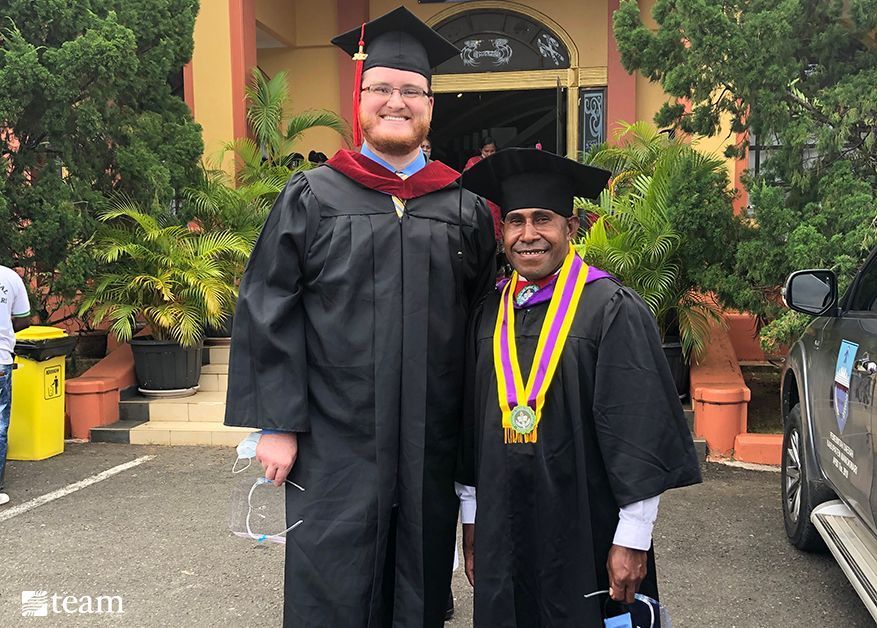Nimbrot was a kid when white, Western missionaries came to his part of Papua, Indonesia.
“Now,” Nimbrot says, “it’s our turn.”
It’s a rare attitude in Nimbrot’s tribe, the Auyu. Since the first missionaries came to and left South Papua, the Church there has struggled with discipleship and growth.
Nimbrot decided to become a pastor in his 20s and was quickly sucked into a leadership vacuum. Without any Bible training, he became a regional leader for his denomination.
But Nimbrot was already thinking beyond his region.
He knew there were many tribes, deep inside Papua’s jungles, who hadn’t heard the Gospel at all. While his tribe struggled to build a strong church, others were — and are — still utterly lost. And Nimbrot realized his people could be the ones to reach them.
Born in a Stunted Church
Had Nimbrot grown up on the north coast of Papua, his path likely would have been easier.
When missionaries came to North Papua , the Gospel was embraced wholeheartedly. As the Bible was translated, locals burned their weapons and began preaching to their neighbors. Churches sprouted up. A theological college was started. And in recent years, an indigenous mission board has started sending its own workers to unreached tribes.
In the South, the swampy terrain made it hard for the Gospel to spread from one village to the next. A lack of discipleship led to syncretism — the blending of Christianity with traditional religions. And today, a growing Muslim presence is eagerly winning hearts and minds.
Nimbrot sought out training at a local, unaccredited Bible school. But he knew he needed more — so he went north .
He and his family moved to Manokwari, where he could attend Erikson-Tritt Theological College (ETTC).
Scrubbing ‘Missionary’ of Its Whiteness
ETTC is a TEAM -founded school, with a mix of Indonesian and Western faculty. At 31 years old, Nimbrot was older than many of his classmates. But his years in ministry worked to his benefit.
“He was a little older to go through the experience of education, thinking about how this was going to be applied in ministry, which I think is a real valuable thing for a student,” says ETTC professor and TEAM missionary Isaac Mann.
For many Papuans, the idea of a missionary conjures the image of a white American or European. Isaac works to combat this as a professor of Church history. But Nimbrot has always seen things differently.
In one of his first conversations with Isaac, Nimbrot shared how he saw his work as an answer to the Great Commission — a command given to all believers.
“He was sort of scrubbing the term ‘missionary’ of its whiteness and of its foreignness. … It was a continuation of the work of Peter and Paul and that he could enter into that as well,” Isaac says .

Since earning an advanced degree, Nimbrot has had greater opportunities to preach the Gospel in South Papua. He plans to start a Bible school so more students can be equipped to reach unreached tribes.
A New Church Movement
Nimbrot rallied other classmates around the pioneering vision and built a small team.
After graduating with master’s degree, Nimbrot took his family south to start surveying the area. The goal was to discover ministry opportunities while he waited for his teammates to graduate. But God wasted no time in opening doors.
Soon, Nimbrot was calling Isaac with updates of 10 people baptized, then another seven, and even a new church plant . He’s fighting false doctrines, like the idea that you can pay for salvation.
“He is who he is, and so he ends up evangelizing and preaching in churches, and people respond,” Isaac says.
As his teammates graduate, Nimbrot hopes to start a South Coast Bible school and equip others for pioneering work among unreached tribes. It’s a grand vision, but Isaac says Papuan culture has uniquely prepared Nimbrot for the work.
“We as Americans kind of have this sense [that] we can … plan and we can know what’s going to happen, and Papuans don’t live with that delusion,” Isaac explains. “They’re well aware that the future is unknown and that you kind of go out and … you see what God’s going to do.”
The future may be uncertain, but Nimbrot has confidence in this: God desires to save people of every tribe — and He will do it through faithful believers of every tongue and nation .




















